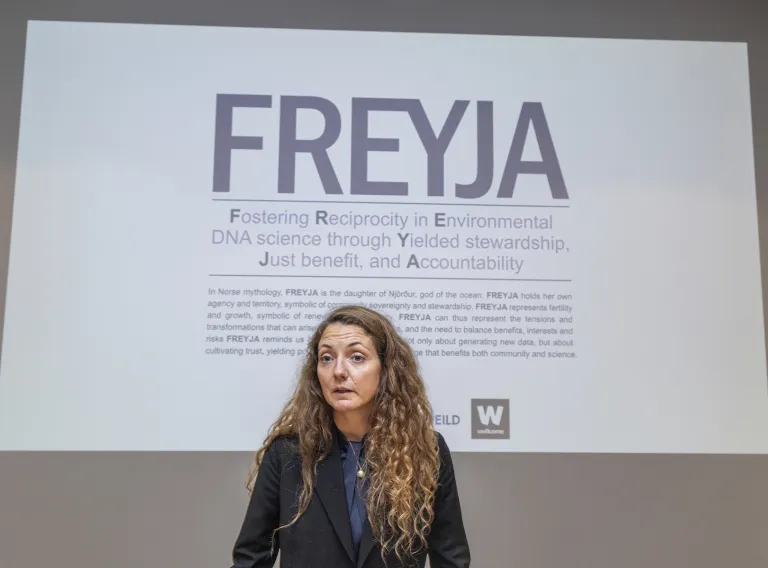
Hrefna Dögg Gunnarsdóttir, Assistant Professor at the Faculty of Law, University of Iceland, has been awarded a grant of nearly three million US dollars—equivalent to over ISK 360 million—by the international research fund Wellcome Trust. The grant will support the research project Fostering Reciprocity in Environmental DNA science through Yielded stewardship, Just benefit, and Accountability (FREYJA). FREYJA aims to strengthen reciprocity in scientific research, including equitable benefit-sharing from utilising research findings and data processing in environmental genomics. Particular emphasis is placed on collaboration between scientists and Indigenous communities.
Environmental genomics involves collecting modern, or ancient, genetic material from organisms via sources such as soil, water, and air, rather than directly from the organisms themselves. Environmental genomic science is expected to revolutionise food, pharmaceutical, and cosmetic production. Thus, this method has the potential to greatly contribute to the well-being of both the planet and humanity. A foundational principle of FREYJA is that such transformative potential must be approached reciprocally, particularly concerning communities that govern the territories where research is conducted. FREYJA aims to explore how to ensure such reciprocity, including fair benefit-sharing arising from data processing and the utilisation of scientific findings, for example, in cases where indigenous peoples grant access to land.
Experienced Research Team
Hrefna Dögg Gunnarsdóttir serves as Principal Investigator and grant recipient. Her recent research has focused on legal requirements for health-related scientific research, including reciprocity in relationship to health data. She also contributed to the preparatory work and advisory board of the Ancient Environmental Genomics Initiative for Sustainability (AEGIS), a project in ancient environmental genomics at the University of Copenhagen. In this role, she has addressed the legal challenges posed by emerging scientific methodologies.
FREYJA is a two-year project comprising four working groups in the fields of law, collaborative research and community engagement, knowledge exchange, and capacity building. Hrefna leads the legal working group, while the remaining three are headed by experts based in different parts of the world:
- Sonia Haoa Cardinali, an independent archaeologist affiliated with the Mata Ki Te Rangi research institute on Rapa Nui (Easter Island), has researched the island for over 50 years. Sonia serves as scientific advisor to the Rapa Nui Council of Elders and leads FREYJA’s working group on Indigenous knowledge exchange.
- Maui Hudson, academic at the University of Waikato, New Zealand, and Director of the Ta Kotahi research institute, has led numerous studies involving active Indigenous participation in discussions on science, ethics, genetics, and technology. Maui heads FREYJA’s working group on collaborative research and community engagement.
- Janet Jull, Canada Research Chair in Accessibility and Person-Centred Care at Carleton University, works in partnerships with many groups including with Indigenous people and communities. Dr. Jull investigates how to conduct collaborative research that supports the priorities and participation of the people the research is meant to benefit.Janet leads FREYJA’s working group on capacity development.
In addition, the FREYJA research team will work closely with Indigenous communities in both Rapa Nui and Canada, as well as with researchers and the advisory board of the AEGIS project at the University of Copenhagen.
